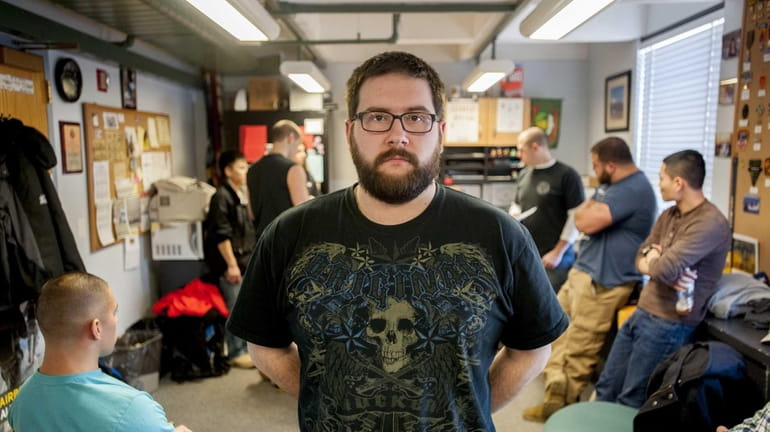Vet groups on college campuses ease transition

Joseph Mulieri, an Iraq Veteran, at Farmingdale State College on Feb. 11, 2014. Mulieri, who mostly kept to himself before he found the veterans outreach service at the college, is now an active member of the college community. Credit: Johnny Milano
Sitting with an anatomy textbook open on his lap in the veterans center at Nassau Community College, Nick Zinani patted areas of his body and named them in sequence -- cervical region, axilla, cubital fossa -- as a fellow veteran nodded approvingly.
It was a campus collaboration that would have felt unbearable to him only months earlier, said Zinani, 28, a former infantry scout who served in Iraq with the Army's 82nd Airborne.
"When I first got back to school, I didn't talk to anyone from September until halfway through October," Zinani said.
But veterans organizations like the college's Student Veterans Association are providing a springboard toward campus life for Zinani and other veterans from Iraq and Afghanistan whose age and combat experience often leave them feeling out of place among students as much as 10 years their junior.
Zinani, who before joining the SVA last semester spent as little time on campus as possible, said he has since then felt more engaged by college life. Having before felt so isolated he would spend his free time studying in his car, he recently joined the college's Gaelic Society.
"Before then, I would just get to class 15 to 20 minutes early, sit in the front, write everything down and go home and study," said Zinani, an affable Long Beach resident whose assortment of tattoos hint at his military service. "Until I met the guys in the group, I had no interest in making friends on campus."
Although veterans study harder than non-vets of the same age, they tend to be less engaged in campus life, according to a study released in December by the American Council on Education.
Some student veterans say they have shunned campus involvement because they feel antagonized by anti-war attitudes espoused by their nonmilitary student counterparts.
"A lot of times, the first question out of their mouth is, 'Have you ever killed anybody?' " said Mike Comparato, a former Marine Corps combat medic who served in Afghanistan and is now one of about 170 veterans among Farmingdale State College's 8,000 students.
Others have said that after enduring military life, in which hardship is routine and excuses rarely tolerated, it is maddening to hear classmates whine about too much homework or parents who refuse to pay cellphone bills. Still others have said lingering combat-related anxieties make them crave the companionship of people who have shared similar experiences and know their pain.
A need for networking
But this self-isolation can harm veterans whose academic careers are typically years behind their civilian counterparts, college officials say. It robs them of collaborative opportunities and social networking that could help their studies and boost their careers.
And because veterans make up a tiny fraction of students at area campuses -- there are about 300 veterans among Nassau Community College's more than 22,000 students -- campus veterans associations have provided a useful focus for information, resources and camaraderie that can boost a veteran's chances of success.
"A guy who has been in the military for four or eight years and now he's trying to jump back into college with classmates who are right out of high school -- it's hard to fit in," said Eric Farina, director of Veterans Services at Farmingdale State College.
Farina has seen it himself. A former Army National Guard platoon sergeant, he served in Afghanistan in 2008-2009 with the 69th Infantry Regiment. When he was hired in 2011, the growing number of veterans on Farmingdale's campus had no central source of information on GI Bill financial aid or other veteran-friendly resources.
Feeling welcome
Joseph Mulieri, 26, a former National Guard soldier, said he was still so stressed from combat in Iraq when he began taking classes at Farmingdale in 2009 that he quit within a few weeks. But since re-enrolling two years ago and joining Farmingdale's veterans organization, he felt welcome enough to volunteer as president of the campus tech club.
He attributes his early anxiety to a deployment that exposed him to episodes of extreme danger, including one while he was Skyping with his mother. A mortar shell exploded close enough for her to see his tent suddenly clouded with dust before the screen went blank. It was two days before he could let her know he had survived unharmed.
He returned from combat four days before the fall 2009 semester began, but had not yet shed his wartime anxieties. Being surrounded by crowds of unfamiliar students left him uneasy on campus. Even driving between Farmingdale and his Commack home reminded him of the roadside bombs that had been a constant threat during his time in Iraq.
"I was tense. Not hostile -- but just suspicious of everyone," Mulieri said of his first time at Farmingdale. "It wasn't the place I needed to be at that point."
Determined to get a degree in computer security, he enrolled again three years later. By chance, he met Farina, who was in the process of setting up Farmingdale's veterans association.
Now the organization's office daily draws a standing-room crowd. On a recent Wednesday, one vet helped another with an assignment. Another handled phone inquiries. A small group swapped stories they said they would never feel comfortable sharing with someone who hadn't been in the military themselves.
"The ability to come here decidedly allowed me to relax about being on campus," Mulieri said. "Before this, there was no place on campus I could really feel comfortable."
